English CBSE Class 12 NCERT Flamingo Chapter 5 Indigo Free Solution of Extra Questions and Answers – Extract Based Questions Short Answer Questions Long Answer Questions and Value Based Questions
INDIGO
(Extra Questions)
Multiple Choice Questions
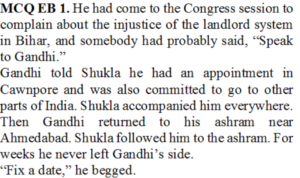

(i) ‘He had come to the Congress session’. Who has been referred to as ‘he’ in this line?
(a) Gandhi
(b) Landlord
(c) Shukla
(d) Any of the above
(ii) According to passage, for how many days Shukla remained with Gandhi?
(a) less than seven days
(b) more than 14 days
(c) exactly seven days
(d) none of the above
(iii) Where was ashram of Gandhi situated?
(a) in Ahmedabad
(b) at Ahmedabad
(c) over Ahmedabad
(d) close to Ahmedabad
(iv) In your opinion what date Shukla wanted Gandhi to fix?
(a) date of speech
(b) date of war
(c) date of visit
(d) date of fast
(v) Which word as used in the extract is a synonym to ‘bound’?
(a) complained
(b) fixed
(c) appointment
(d) committed
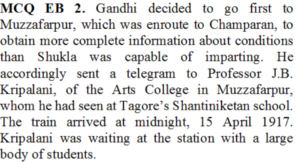

(i) Gandhi decided to go to Muzzafarpur because –
(a) He wanted to get complete information
(b) Shukla was incapable of giving all information
(c) Muzzafarpur was enroute to Champaran
(d) Both (a) and (b)
(ii) In your opinion, why did Gandhi sent a telegram to J.B. Kriplani?
(a) Because Gandhi knew J. B. Kriplani
(b) Because Gandhi wanted Kriplani to know about his arrival
(c) Because Gandhi did not want to reach without information
(d) All of the above
(iii) Where did Gandhi meet J.B. Kriplani earlier?
(a) In a school
(b) In a college
(c) On a railway station
(d) Cannot be ascertained from the extract
(iv) Which word as used in the extract is synonymous to ‘group’?
(a) midnight
(b) enroute
(c) body
(d) obtain
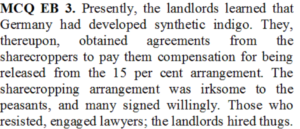

(i) What does the phrase ‘synthetic’ as used in the extract mean?
(a) natural
(b) organic
(c) artificial
(d) synchronized
(ii) In above extract to whom does the word ‘they’ refer to?
(a) Germany
(b) lawyers
(c) sharecroppers
(d) landlords
(iii) Who signed the agreement willingly?
(a) many peasant
(b) many sharecroppers
(c) both (a) and (b)
(d) none of above
(iv) Which word in the extract is synonymous to ‘goons’?
(a) lawyers
(b) peasants
(c) thugs
(d) lanlords
(v) What did landlords demand for releasing peasants from sharecropping arrangements?
(a) penalty
(b) signature
(c) compensation
(d) synthetic indigo
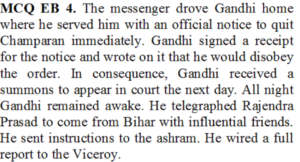

(i) ‘he served him with an official notice’. Who served notice to whom?
(a) Gandhi served notice to Champaran
(b) Court served notice to Gandhi
(c) Messenger served notice to Gandhi
(d) Gandhi served notice to Viceroy
(ii) Which of the word as used in the extract is synonymous to ‘telegraphed’?
(a) drove
(b) received
(c) remained
(d) wired
(iii) ‘All night Gandhi remained awake’. Which of the following works were not done by Gandhi during that night
1. Telegraphed Rajendra Prasad
2. Signed receipt of notice
3. Sent instructions to ashram
4. Decided to disobey the order
5. Wired a full report to Viceroy
(a) 1 and 4
(b) 2 and 3
(c) 3 and 4
(d) 2 and 4
(iv) Why did Gandhi receive summons to appear in the court?
(a) He had called Rajendra Prasad
(b) He had signed receipt of the order
(c) He had informed Viceroy
(d) He had refused to obey the order
(v) Which of the following word has not been used as a noun in the extract?
(a) notice
(b) disobey
(c) report
(d) friends
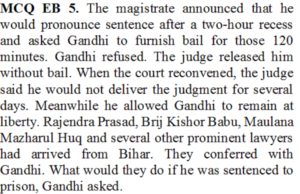

(i) Which word as used in the extract is synonymous to ‘break’?
(a) bail
(b) court
(c) recess
(d) liberty
(ii) What did Gandhi refuse?
(a) To write a sentence
(b) To plead guilty
(c) To consult lawyers
(d) To furnish bail
(iii) ‘What would they do if he was sentenced to prison …’ To whom does the word ‘they’ refers to in this part of sentence?
(a) magistrate
(b) judge
(c) lawyers
(d) none of the above
(iv) The court deferred its judgment by –
(a) two hours
(b) 120 minutes
(c) many days
(d) None of the above
(v) Which of the following could not have been a reason for lawyers to come to Gandhi-
(a) They wanted to support Gandhi
(b) They wanted to plead for Gandhi
(c) They wanted to plead against Gandhi
(d) They wanted to exhibit their unity with Gandhi
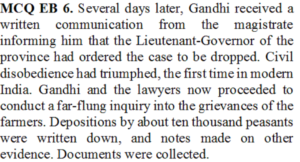

(i) All the following words are synonyms of ‘dropped’. Which of the following word is closest to ‘dropped’ as used in the extract?
(a) fell
(b) discarded
(c) cancelled
(d) sent
(ii) Who had approved the case against Gandhi to be dropped?
(a) Peasants
(b) Magistrate
(c) Lieutenant-Governor
(d) Gandhi
(iii) Who among the following did not participate in the enquiry into the problems of farmers?
1. Peasants
2. Gandhi
3. Magistrate
4. Lawyers
5. Lieutenant-Governor
(a) 1 only
(b) 3 only
(c) 1 and 3
(d) 3 and 5
(iv) In your opinion, which of the following was not a means of conducting inquiry into the problems of farmers?
(a) making statements
(b) collecting documents
(c) making notes
(d) recording statements
(v) Which of the following is not correct for number of peasants whose depositions were written down?
(a) close to ten thousand
(b) nearly ten thousand
(c)approximately ten thousand
(d) precisely ten thousand
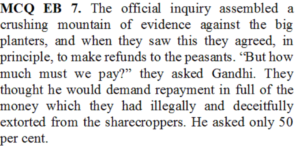

(i) For whom is the word ‘they’ used in above extract?
(a) official
(b) Gandhi
(c) sharecroppers
(d) big planters
(ii) What portion of refund was asked by Gandhi?
(a) half
(b) total
(c) in percent
(d) none of above
(iii) Which of the following word indicates that the investigations were legal?
(a) illegal
(b) official
(c) principle
(d) crushing
(iv) According to the extract, what quantum of money planters were ready to repay?
(a) 50 percent
(b) half of the amount
(c) full amount
(d) they did not know
(v) According to the extract, which of the following statements are correct?
1. Large amount of evidences were collected
2. Big planters had a principle about repayment
3. Sharecroppers were a powerful group
4. Gandhi was in favour of peasants
5. Gandhi did not ask for full refund
(a) 1, 2 and 3
(b) 2, 3 and 4
(c) 1, 4 and 5
(d) 3, 4 and 1
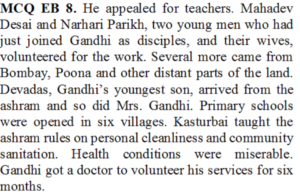

(i) From which of the following place, volunteers had come?
(a) Ashram
(b) Bombay
(c) Poona
(d) All the above
(ii) Which of the following initiative was not taken?
(a) Education
(b) Sanitation
(c) Health services
(d) Recreation facilities
(iii) Which of the following word as used in the extract imply ‘followers’?
(a) Volunteers
(b) Disciples
(c) Teachers
(d) Services
(iv) According to the extract, who among the following had not volunteered for education?
1. Mahadev Desai
2. Narhari Parikh
3. Doctor
4. Mahadev Desai
5. Kasturbai
(a) 1 and 2
(b) 2 and 3
(c) 3 and 4
(d) 3 and 5
(v) A phrase ‘distant parts’ has been used in the extract. Which of the following is not the correct use of word ‘distant’?
(a) distant places
(b) distant relatives
(c) distant memory
(d) All are right uses
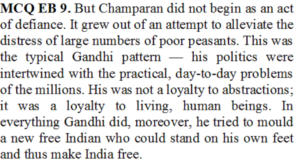

(i) According to the extract, events at Champaran had started as an –
(a) act of defiance
(b) act of Gandhi
(c) act of alleviation
(d) act of God
(ii) In above extract Gandhi has been projected as a –
(a) God
(b) Follower
(c) Visionary
(d) Politician
(iii) Which of the following was not the style of politics of Gandhi?
1. According to day to day problems
2. Loyalty to human beings
3. Loyalty to abstraction
4. Mould a dependent India
(a) Only 1
(b) 1 and 2
(c) 2 and 3
(d) 3 and 4
(iv) A phrase ‘day-to-day’ has been used in the extract. Which of the following is not the correct use of this phrase?
(a) day-to-day requirements
(b) day-to-day punishments
(c) day-to-day assessments
(d) day-to-day millions
(v) Meaning of which word / phrase in the extract is closest in its meaning to ‘mixed’?
(a) tried
(b) grew
(c) intertwined
(d) none of the above
Extract Based Questions


1. Who is referred as ‘he’ in above extract?
2. In which state was the convention held?
3. Which word in the extract is synonym of ‘yearly’?
4. Who met ‘he’ to request him to come to his hometown?


1. Name the place referred to in above extract?
2. In which state is ‘the place’?
3. Which word in the extract mean ‘at the base of a mountain’?
4. Which country has been mentioned in the above extract?


1. Who is referred to as ‘they’ in above extract?
2. In whose house had Gandhiji stayed?
3. Who is referred as ‘him’ in the above extract?
4. Which word in the extract is synonym of ‘farmer’?


1. Why sharecroppers came to the town?
2. For how many days Gandhiji stayed in Muzzafarpur?
3. In whose house was Gandhiji staying?
4. Which word in the extract is synonym of ‘arrival’?


1. Why Gandhiji thought that it was useless to go to court.?
2. Which crop were sharecroppers growing?
3. In which city meeting between lawyers and Gandhiji took place?
4. Which word in the extract is synonym of ‘scolded’?
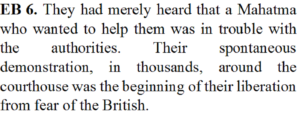

1. Who is referred as ‘they’ in the above extract?
2. Who is referred to as ‘Mahatma’ in above extract?
3. Which word in the extract is synonym of ‘immediate’?
4. In which town people had gathered?


1. Who is referred as ‘he’ in above extract?
2. Who is referred as ‘them’ in above extract?
3. Which word in the extract is synonym of ‘power’?
4. Outside of which building the above incident had happened?
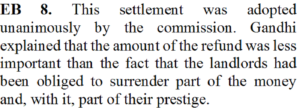

1. What was the extent of refund agreed by Gandhiji?
2. What percent of refund had Gandhiji demanded earlier?
3. Which word in the extract is synonym of ‘agreed by all’?
4. According to Gandhiji what was of less importance?


1. Who is the speaker of above extract?
2. To whom were these lines spoken to?
3. Who is referred to ‘Englishman’ in above extract?
4. Which word in the extract mean ‘depend’?
Short Answer Questions – 30 to 40 words


Answer: After development of synthetic Indigo, demand of natural Indigo reduced. So growing of Indigo was not profitable. The British now wanted to cancel the agreement with sharecroppers. But they wanted a compensation for this.


Answer: Gandhiji wanted to know facts about sharecropping. He met the secretary of British Landlords’ Association to get information about it.
Secretary told Gandhiji that information could not be given to an outsider. Gandhji had replied that he was not outsider. The secretary did not give any information.


Answer: The commissioner was the highest official of the Tirhut division. Champaran was in this division. Gandhiji wanted to know facts about sharecropping. The commissioner bullied him and advised to leave Champaran.


Answer: Gandhiji was issued an official order to leave Champaran. He did not want to be a lawbreaker hence wanted to obey the order.
He wanted to also serve the humanitarian and national cause. This required him to stay at the Champaran.
This was the conflict of duties.


Answer: Villages of Champaran were backward on cultural and social aspects. Gandhiji stayed in Champaran to improve these conditions.
On his appeal, teachers and doctors volunteered to start schools and health services in the region. His wife took to cause of sanitation.


Answer: Lawyers of Champaran wanted to take support of Andrews in fighting the cause of farmers.
Gandhiji strongly objected to this idea. He told them that if their cause was true and justified, they could win by themselves. There was no need to take support of a person because he is British.
Thus he taught the lesson of self-reliance.


Answer: Gandhiji felt that peasants were crushed and very afraid. The real relief for them would be to make them free of fear.
Hence he thought that taking the case to court was useless?


Answer: Gandhiji decided to go to Muzzafarpur to obtain complete information about conditions of sharecropping and of peasants. He thought that Shukla may not be capable of giving him all the information.


Answer: Rajendra Prasad was not at his house. His servants knew Shukla as a poor farmer. They considered Gandhiji also a poor farmer and allowed them to stay on ground. They did not allow Gandhiji to draw water from the well.


Answer: When Gandhiji was at Muzzafarpur, news spread about his arrival and his mission. People started coming to meet him. They considered him as champion of their cause.
Later people came to know that he was in trouble with authorities. They came in large numbers and assembled around the court. This was to show their support to Gandhiji.


Answer: Initially lawyers wanted to go back to their respective homes if Gandhiji was arrested. But later they decided to go to prison with Gandhiji. Thereby committing their support to Gandhiji and local farmers.
Hence Gandhiji said above words.


Answer: A large crowd had gathered outside the court house in support of Gandhiji. The judge did not want to ignite the feelings of crowd. So he wanted to defer the trail.
Gandhiji had probably sensed that in the presence of crowd, judge may have to set him free. That would be a victory of civil disobedience. Therefore he protested against the delay.


Answer: Gandhiji used to regularly send instructions through letters and telegrams. He used to receive financial and other reports of ashram through mail. This way he kept himself aware of all the activities of ashram.


Answer: Shukla followed Gandhiji to Cawnpore and other parts of India. He even went to his ashram. He had been requesting Gandhiji to come to Champaran to solve problems of farmers. He did not leave Gandhiji till he got a date.
Therefore Gandhiji was impressed by Shukla.


Answer: To free peasants from the long term agreement, landlords wanted a compensation. The peasants were poor and were under constant threat from landlords.
Gandhiji made landlords agree to free peasants from the earlier agreement. They refunded 25% amount to peasants. Gandhiji also worked to improve their social, cultural and health conditions.


Answer: Under the sharecropping arrangement, peasants were required to grow indigo on 15% of the land. This entire crop was to be given to landlords as rent.


Answer: Most of the arable land in Champaran was divided into large estates owned by British landlords. They rented their land to local peasants. The farmers were required to grow Indigo in 15% of the area and give this entire crop to landlords as rent.
This was called sharecropping.


Answer: Along with compensation the British had to surrender part of their prestige also. The struggle established that British could be challenged. Peasants understood that they had rights and defenders. They became courageous.
Therefore the Champaran episode is considered a success and a victory.


Answer: During those days local people were very afraid to provide any support or sympathy to those who advocated home-rule movement. Prof. Malkani was a Government servant. Therefore Gandhiji considered it quite unusual that Prof Malkani had allowed him to stay at his house.


Answer: Gandhiji came to Champaran because Rajkumar Shukla had insisted.
After reaching there, he obtained complete information about sharecropping. He got convinced that peasants were oppressed, injustice was done to them and they lived in constant fear.
Hence to render humanitarian and national service, Gandhiji took up their cause.


Answer: Before appearing at the court, Gandhiji had sent a full report about sharecropping to Viceroy. The Lieutenant General had realsied that the cause taken up by Gandhiji was justified. Gandhiji had complete support of peasants and lawyers.
Owing to above aspects he dropped the case against Gandhiji.


Answer: According to the lesson Indigo, an ordinary peasant looked poor and emaciated. Most of them were not literate and thus depended on others for any legal matter. They were afraid to unite even for a justified cause.


Answer: It means that in the morning lot of peasants had gathered in Motihari.
The word black in this sentence represents colour of hair of peasants. So the town was black with peasants means that huge number of peasants had come to Mothihari.
Long Answer Questions – 120-150 words


Answer: Under the sharecropping arrangement, peasants were required to grow indigo on 15% of the land. This entire crop was to be given to landlords as rent.
After development of synthetic indigo, demand of natural indigo reduced. Landlords wanted to free farmers from the agreement after obtaining some compensation.
The poor farmers were not in a position to pay compensation. Those who protested were threatened. Those who engaged lawyers were beaten by the thugs hired by landlords.
Hence all the farmers were living under constant fear. They felt crushed. There was no relief from fear.
Gandhiji realised that farmers deserved to lead a humanitarian routine of life. This could not be achieved through court. This could be achieved only if they did not have to face fear in their daily life.
Hence Gandhiji thought that it was more important to remove fear from the minds of farmers.


Answer: Civil disobedience means challenging and refusing to obey the unjustified orders of authorities through peaceful means.
The first instance is the refusal to obey the verbal order of Commissioner to leave Tirhut region. Gandhiji went to Motihari.
The second instance is to refuse to obey the written order of authority to immediately leave Champaran area. Gandhiji wrote on the receipt that he will not obey the order.
The third instance had occurred at the court room. There was lot of crowd outside the court room. The judge wanted to delay the trial. But Gandhiji pleaded guilty and requested the judge to pronounce the penalty. Now the judge was in a fix and said that he will give judgement after two hours. The judge asked Gandhiji to give a bail for these 120 minutes. Gandhiji again refused to give the bail so judge allowed him two hours without bail. The court case was finally dropped.
All such instances of civil disobedience were done without violence.


Answer: First he went to Muzzafarpur to obtain complete information about sharecropping. Many peasants and lawyers came to meet him there. Here Gandhiji decided that real relief for peasants was to be free from fear.
He met secretary of British landlords’ association and Commissioner of Tirhut region. Meanwhile a court case was made against him for disobeying the order to leave Champaran area.
Gandhiji conducted a detailed enquiry into the situation of sharecroppers. Thousands of documents and depositions were collected.
The Lieutenant Governor called Gandhji. An official commission of enquiry was appointed to look into situation of sharecroppers. To break the deadlock, Gandhiji agreed to accept refund of 25% money to sharecroppers.
On his appeal, teachers and doctors volunteered to start schools and health services in the region. His wife took to cause of sanitation.
Thus Gandhiji also worked to remove cultural and social backwardness of the area.


Answer: During early action of Champaran, lawyers of Champaran wanted to take support of Andrews. Gandhiji strongly objected to this idea. He told them that if their cause was true and justified, they could win by themselves. There was no need to take support of a person because he is British. Thus he taught the lesson of self-reliance.
Gandhiji did not follow advice of Commissioner to leave Tirhut region. He refused to obey the written order of authority to immediately leave Champaran area. Gandhiji refused to give the bail for two hours. The judgement was deferred and the case was eventually dropped. Victory was achieved by disobedience through peaceful means. This later became one of the means to obtain independence for India.
Owing to efforts of Gandhiji an official commission of enquiry was appointed to look into situation of sharecroppers. To break the deadlock, Gandhiji agreed to accept refund of 25% money to sharecroppers. Gandhiji also worked to remove cultural and social backwardness of the area.
Thus in Champaran, self-reliance, Indian Independence and help to sharecroppers were all bound together.


Answer: Under the sharecropping arrangement, peasants were required to grow indigo on 15% of the land. This entire crop was to be given to landlords as rent. After development of synthetic indigo, demand of natural indigo reduced. Landlords wanted to free farmers from the agreement with compensation.
The poor farmers were not in a position to pay compensation. Those who protested were threatened. Those who engaged lawyers to fight in court were beaten by the thugs hired by landlords.
Gandhiji collected thousands of document and depositions of farmers. He was convinced that injustice was being done to farmers. Owing to efforts of Gandhiji an official commission of enquiry was appointed to look into situation of sharecroppers. To break the deadlock, Gandhiji agreed to accept refund of 25% money to sharecroppers. Now peasants learnt about their rights and become courageous. Gandhiji also worked to remove cultural and social backwardness of the area.


Answer: During Champaran episode, first of all, Gandhiji tried to find the truth. He met several government officials, secretary of landlord association, lawyers and peasants. He collected many documents and deposition of thousands of peasants. He had sent these evidences to higher officials of British. Thus the foundation of Satyagraha was laid for the first time.
He understood that people were oppressed. He realized that the true relief would come only if they were set free from fear.
Later a written order was served on him to leave Champaran. During the court case thousands of people gathered outside the court to indicate their support to him. He pleaded guilty in the court and requested to announce penalty. He refused to submit bail. Eventually the case was dropped. These were the first instance of civil disobedience through non-violence.
Gandhiji built up his struggle for independence through these means of Satyagraha, civil disobedience and non-violence.
Hence the Champaran episode is considered as beginning of Indian struggle for independence


Answer: After a long discussion with Lieutenant Governor, an official commission of inquiry was appointed. Gandhiji was the sole representative of peasants.
The commission collected evidences. These were against the landlords. So they agreed to make refund. But how much should they should pay was yet to be determined. Gandhiji had asked for 50% and he appeared to be adamant. However in order to break the deadlock he accepted the offer of 25% refund.
While refunding some of the money, landlords had to surrender part of their prestige as well. The peasants understood that they also had rights and defenders. They learnt to have courage.
Had Gandhiji not broken the deadlock, condition of poor peasants would have become worse. The realization that British could be defeated was more valuable. Peasants becoming courageous was an icing on the cake.


Answer: Ghandiji had come to Bihar for the sole purpose to help sharecroppers. He had started his efforts by collecting information and understanding the truth.
Most of the landlords were British. So efforts of Gandhiji were considered as being against the British. The British administration ordered him to go away from Tirhut division. Gandhiji refused to obey this order. The court summoned him for disobedience of official orders.
A large crowd gathered outside the court on the day of hearing. Gandhiji did not agree for giving monetary guarantee for bail. The court finally let him free. Later higher official of the province ordered for the case to be dropped.
Finally through negotiation with the landlords, Gandhiji was able to free peasants from sharecropping agreements.
Thus Gandhji merely wanted to solve the problem of peasants. He did not want to challenge the British rule. But he had to do disobey them to ensure justice to peasants.
****



0 Comments